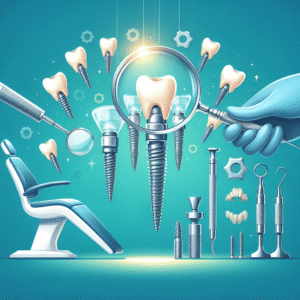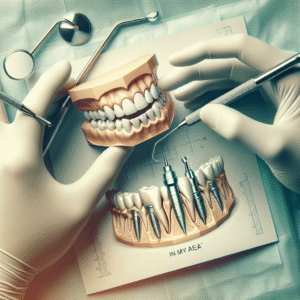The All-on-4 dental implant procedure has revolutionized restorative dentistry by offering a permanent solution for patients with missing teeth. This technique provides a full-arch restoration using just four strategically placed implants, making it a popular choice for those seeking Full-Arch Dental Implants or Teeth-in-a-Day / Same-Day Implants. However, despite its advantages, the procedure is not without potential complications. Understanding these challenges is crucial for patients considering Implant-Supported Dentures or alternative solutions like Zygomatic Implants and Bone Grafting for Dental Implants.
In this article, we will explore the common problems associated with the All-on-4 procedure, their causes, and possible solutions to ensure patients make informed decisions.
1. Insufficient Bone Density and the Need for Bone Grafting
One of the primary challenges with the All-on-4 technique is the requirement for adequate bone density. Since the procedure relies on just four implants to support an entire arch, the jawbone must be strong enough to withstand the pressure. Patients with significant bone loss—often due to prolonged tooth absence or periodontal disease—may not qualify for traditional All-on-4 implants without additional procedures like Bone Grafting for Dental Implants.
Why Bone Grafting May Be Necessary
- Prevents Implant Failure: Weak bone structure increases the risk of implant loosening or failure.
- Enhances Osseointegration: Grafting promotes better fusion between the implant and bone.
- Alternative Solutions: Patients with severe bone loss may require Zygomatic Implants, which anchor into the cheekbone instead of the jaw.
However, bone grafting extends treatment time and adds to the overall cost, making it a less appealing option for those seeking Teeth-in-a-Day / Same-Day Implants.
2. Risk of Implant Failure or Loosening
While the All-on-4 procedure boasts high success rates, implant failure remains a possibility. Several factors contribute to this issue:
Common Causes of Implant Failure
- Poor Osseointegration: If the bone doesn’t fuse properly with the implant, stability is compromised.
- Excessive Force: Bruxism (teeth grinding) or improper bite alignment can overload the implants.
- Infection (Peri-Implantitis): Bacterial infections around the implant site can lead to bone loss.
Patients opting for Implant-Supported Dentures must follow strict oral hygiene practices and attend regular dental check-ups to mitigate these risks.
3. Prosthetic Complications
The All-on-4 system includes a fixed prosthetic arch attached to the implants. While durable, these restorations can encounter problems:
Potential Prosthetic Issues
- Fractures or Wear: The acrylic or porcelain teeth may chip or crack over time.
- Fit Adjustments: Changes in gum or bone structure may require prosthetic modifications.
- Maintenance Requirements: Unlike natural teeth, Full-Arch Dental Implants need periodic adjustments.
Patients should be prepared for possible follow-up visits to ensure long-term functionality.
4. Nerve Damage and Surgical Risks
As with any surgical procedure, the All-on-4 technique carries inherent risks, including nerve damage. Improper implant placement can affect nerves in the lower jaw, leading to:
- Numbness or Tingling
- Chronic Pain
5. Limited Adjustability Compared to Traditional Dentures
While Implant-Supported Dentures offer superior stability, they lack the adjustability of removable dentures. Issues include:
- Difficulty in Cleaning: Fixed prosthetics require specialized tools for maintenance.
- Non-Adjustable Fit: Unlike traditional dentures, All-on-4 implants cannot be easily modified if bone structure changes.
Patients must weigh these limitations against the benefits of a permanent solution.
6. High Initial Cost and Insurance Challenges
The All-on-4 procedure is a significant investment. Factors influencing cost include:
- Surgical Expertise
- Material Quality
- Additional Procedures (e.g., Bone Grafting for Dental Implants)
Many insurance plans classify the treatment as cosmetic, leaving patients with substantial out-of-pocket expenses.
7. Not Suitable for All Patients
Certain medical conditions may disqualify candidates for All-on-4 implants, such as:
- Uncontrolled Diabetes
- Severe Osteoporosis
- Autoimmune Disorders Affecting Healing
In such cases, alternatives like Zygomatic Implants or conventional dentures may be recommended.
Conclusion
The All-on-4 dental implant procedure offers a life-changing solution for many patients, providing the benefits of Full-Arch Dental Implants and Teeth-in-a-Day / Same-Day Implants. However, potential problems—such as bone density issues, implant failure, prosthetic complications, and surgical risks—must be carefully considered.
Patients should consult with a qualified dental professional to assess their eligibility and explore alternatives like Bone Grafting for Dental Implants or Zygomatic Implants if necessary. By understanding these challenges, individuals can make informed decisions and achieve the best possible outcomes for their oral health.
Frequently Asked Questions
FAQ: All-on-4 Dental Implant Procedure Problems
Q1: What are the most common problems with All-on-4 dental implants?
A1: Common problems include implant failure, infection, nerve damage, and issues with improper fit or bite alignment.
Q2: How can I reduce the risk of complications with All-on-4 implants?
A2: Choose an experienced surgeon, maintain excellent oral hygiene, follow post-op care instructions, and attend regular dental check-ups.
Q3: What should I do if my All-on-4 implants feel loose or uncomfortable?
A3: Contact your dentist immediately—looseness could indicate implant failure or infection, which needs prompt attention.
Q4: Are All-on-4 implants prone to long-term problems?
A4: While durable, long-term issues like bone loss, wear on prosthetic teeth, or gum recession can occur without proper care and maintenance.




